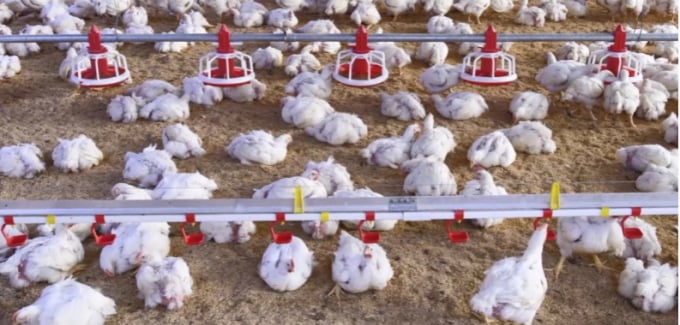June 19, 2025 | 04:26 GMT +7
June 19, 2025 | 04:26 GMT +7
Hotline: 0913.378.918
June 19, 2025 | 04:26 GMT +7
Hotline: 0913.378.918

Thai chickens are raised in closed system houses following high animal-welfare principles. This allows the chickens to stay healthy, thus reducing the chance of antibiotic use and, eventually, supporting the One Health principle. Photo: The Nation
The "3C platform", embracing consolidation, contribution and collaboration, is the key to success for Thailand's broiler industry, Charoen Pokphand Foods Plc (CP Foods) said.
The platform will enable Thai farmers to adopt a more efficient and more sustainable business model as well as assure consumers around the world about safety, hygiene and traceability throughout the supply chain.
Dr Payungsak Somyanontanagul, DVM, vice president and head of CP Foods Animal Welfare Committee, said that the company has placed great importance on animal welfare practices and is one of the strategic goals of the company's CPF 2030 Sustainability in Action.
The 3C platform will ensure safety, hygiene and traceability of Thailand's broilers to consumers around the world.
In terms of consolidation, Payungsak said the industry should consolidate and further develop its strengths to improve competitiveness.
He explained that the Thai broiler supply chain has a number of strong points, such as advanced disease prevention system. CP Foods said it is cooperating with the Department of Livestock Development to set up a poultry compartment system according to the standards of the International Organisation for Animal Health to proactively prevent the outbreak.
"Moreover, Thai chickens are raised in closed system houses following high animal-welfare principles. This allows the chickens to stay healthy, thus reducing the chance of antibiotic use and, eventually, supporting the One Health principle," he said.
In terms of contribution, Payungsak said the industry should focus on advanced technology development to increase efficiency, reduce costs and be environmentally friendly.
"Moreover, the principles of the Bio-Circular-Green Model should be integrated into all aspects of business, covering feed, farm and food," he said.
He pointed out that CP Foods is currently working on multiple research and development projects, such as alternative feed ingredient, precision nutrition, and autogenous vaccine for Thai livestock to improve the competitiveness of the industry and reduce dependence on imports.
For collaboration, Payungsak said partnership and contribution from all related sectors are crucial for strengthening broiler industry competitiveness and to achieve the goal of development of a product champion for the country.
Aside from this principle, he said CP Foods focuses on research and development to enhance animal welfare standards throughout the supply chain, adding that 100 per cent of the company's farm animals are raised according to five freedom principles with responsible and prudent antibiotics.
He added that the company has adopted Smart Farm to increase production efficiency and promote animal welfare in broiler farms, in which artificial intelligence and automation enable CP Foods to control the environment and ensure the well-being of the animals within the farm.
"In 2021, CP Foods improved its score to Tier 3 on the latest version of Business Benchmark on Farm Animal Welfare report, showing significant development in the areas of innovation and leadership, as well as performance reporting and impact," he added.
(The Nation)

(VAN) Extensive licensing requirements raise concerns about intellectual property theft.

(VAN) As of Friday, a salmonella outbreak linked to a California egg producer had sickened at least 79 people. Of the infected people, 21 hospitalizations were reported, U.S. health officials said.

(VAN) With the war ongoing, many Ukrainian farmers and rural farming families face limited access to their land due to mines and lack the financial resources to purchase needed agricultural inputs.

(VAN) Vikas Rambal has quietly built a $5 billion business empire in manufacturing, property and solar, and catapulted onto the Rich List.

(VAN) Available cropland now at less than five percent, according to latest geospatial assessment from FAO and UNOSAT.

(VAN) Alt Carbon has raised $12 million in a seed round as it plans to scale its carbon dioxide removal work in the South Asian nation.

(VAN) Attempts to bring down the price of the Japanese staple have had little effect amid a cost-of-living crisis.